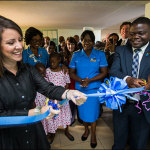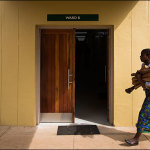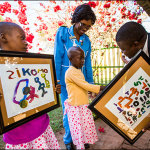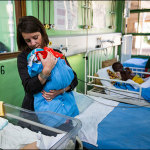June 28, 2016
 It’s one of parents’ worst fears – their child has a complex or life-threatening illness. How do they decide where to go for the comprehensive care their child needs?
It’s one of parents’ worst fears – their child has a complex or life-threatening illness. How do they decide where to go for the comprehensive care their child needs?
Over the years, the U.S. News & World Report Best Children’s Hospitals rankings have helped thousands of parents identify top sources of care for children with the most difficult medical problems. And Texas Children’s Hospital has consistently been among them.
On the 2015–16 Best Children’s Hospitals Honor Roll, which recognizes pediatric centers that are highly ranked in multiple specialties, Texas Children’s, working closely with academic partner Baylor College of Medicine, ranked no. 4 in the nation for the fifth consecutive year. It is the only children’s hospital in Texas on the Honor Roll.
“We’re rightfully proud of the great work that Texas Children’s does day in and day out on behalf of sick children and their families, but we know we have room for improvement,” said Texas Children’s Physician-in-Chief Dr. Mark W. Kline. “To the degree that the U.S. News survey can help us develop a blueprint for being the world’s best and highest quality pediatric health care institution, we are pursuing that.”
In a process that has become increasingly rigorous and data driven, the U.S. News rankings enable hospitals to look in the mirror and scrutinize themselves.
“Do we like the reflection? Are we as good as we think we are?” asked Dr. Angelo P. Giardino, senior vice president and chief quality officer at Texas Children’s. “In many cases, we are, and we’re thrilled because we are a really great children’s hospital. But there are opportunities where we look in the mirror and we say, ‘We could really do that better.’”
Rankings evolve
Beginning in 1990, as part of the Best Hospitals list, the pediatric rankings were 100 percent reputational for more than 15 years, based entirely on a survey of pediatricians and pediatric specialists across the country, asking them to identify the best children’s hospitals.
When U.S. News decided to rank pediatric hospitals separately from adult hospitals, the publication faced a challenging absence of data. While adult hospital rankings were drawn from Medicare data, no comparable source of information about children’s hospitals was available. As a result, U.S. News enlisted RTI International, a nonprofit research and consulting firm that was already the contractor for the Best Hospitals rankings, to develop a methodology for obtaining data directly from the hospitals and to analyze the results.
The first rankings incorporating such data were published in 2007 as General Pediatrics. Texas Children’s Hospital was listed among the top 30 children’s centers.
In 2008, rankings in six specialties, including cancer and neonatal care, were added to the children’s hospital rankings. In 2009, a newly created Honor Roll listed the 10 children’s hospitals out of 160 surveyed that were ranked in all the specialties, which had been increased from six to 10.
The 2015-16 Honor Roll required a hospital to rank in the top 10 percent in three or more specialties. Only 12 pediatric hospitals qualified among 184 surveyed nationwide. Texas Children’s has appeared on every Honor Roll.
In 2015, Texas Children’s ranked no. 2 in three specialties: cardiology/heart surgery, neurology/neurosurgery and pulmonology. Texas Children’s ranked among the top five hospitals in six specialties and in the top 30 hospitals in all 10 specialties.
“The original purpose of the Best Hospitals rankings was to inform patients and families and help them make decisions,” said Health Rankings Editor Avery Comarow, who has directed the Best Hospitals projects since their beginnings. “I now recognize that we don’t necessarily have to just reflect performance. We can also drive it by incorporating metrics that reflect that goal. Every year, our contractor, RTI International, meets with medical experts to evolve the methodology in ways that not only reflect what children’s hospitals are doing, but ways in which they could and should be doing better.”
Quality framework
Today, the U.S. News Best Children’s Hospitals rankings use a well-accepted framework for evaluating the quality of health care:
Structure: hospital resources related to patient care, such as the ratio of nurses to patients, specialized clinics and programs, and certification by external organizations.
Process: compliance with best practices in diagnosis, treatment, prevention and patient education. As a part of the process, reputation now counts as 16.7 percent of the overall score, down from the original 100 percent.
Outcomes: factors such as rates of survival, infection, mobility and cure.
The increasing emphasis on quality measures had strong support from the late Dr. Bernadine Healy, a former director of the National Institutes of Health, who was health editor of U.S. News before her death in 2011.
“Her expertise and perspective were invaluable,” Comarow said. “She had such a strong sense of the things that were important to patients and families. She brought that same perspective to some of the choices that we made in trying to decide which measures to highlight, what sort of weight to give them, how many hospitals we should assign rankings to, and where we would run out of meaningful data as opposed to numbers that looked OK but were not terribly reliable statistically.”
As U.S. News shifted the emphasis toward quality measures, Texas Children’s shifted coordination of the survey response from its Marketing/PR Department to its Quality and Safety Department.
Team effort
The evolution into quality led us to bring all the chiefs of medical and surgical services to the table,” said Mary Jo Andre, senior vice president and chief nursing officer and former senior vice president of Quality and Safety. “The more that quality and best practices were built into the survey, the more accountability of the survey shifted from an administrative standpoint to the medical staff.”
To help build physician engagement, Giardino and Thomas Luerssen, chief quality officer – surgery, were appointed quality officers for Pediatrics and Surgery, respectively, in 2013. The next year, Giardino was named to his present position as chief quality officer of Texas Children’s, and Eric Williams, succeeded him as quality officer for Pediatrics. They work closely with teams of physician section chiefs, practice administrators and data specialists.
Although only 10 clinical areas are ranked, a total of about 20 different services contribute to the survey, such as Radiology, Emergency Services, Intensive Care, Social Work and Nutrition. For example, nursing certification, attention to safe practices and increasing specialty roles of nurses appear in each section of the survey. Texas Children’s receives points for safety because of the hospital’s Magnet certification by the American Nurses Credentialing Center.
“Any outcome is a partnership of nursing and physicians,” Andre said. “The question directly related to nursing is about staffing. Seeing how we compared to the rest of the country has been a good thing for nursing, because it’s driven us to have higher standards as well.”
More than 100 people at Texas Children’s contribute to the survey each year, submitting more than 1,500 survey elements in all. Texas Children’s also is represented in four of the working groups that RTI consults each year in continuing to refine the methodology. Involvement in quality improvement at Texas Children’s is even more far-reaching. More than 400 staff members have been trained in Advanced Quality Improvement.
“Quality improvement, which Texas Children’s is passionate about, extends everywhere,” said Dr. Charles D. Fraser, Jr., chief of Congenital Heart Surgery and surgeon-in-chief at Texas Children’s. “Quality starts immediately when the patient or family arrives here. Everyone is important, whether you’re in housekeeping or food services, the cardiac intensive care unit or are an administrative executive. Everyone is responsible for quality.”
Gap analysis
Texas Children’s analytics team provides data to each section chief with a detailed analysis of the gaps between the section and comparable data from top-ranked peer institutions in the Best Children’s Hospitals rankings. The service chiefs and their clinical and administrative teams review the data closely and objectively, identifying gaps and opportunities to improve quality, access or outcomes.
For example, in Texas Children’s Diabetes and Endocrinology section, gap analysis revealed several opportunities for improvement that are being addressed. To help deal with limited patient access, four new pediatric endocrinologists have been hired. To reduce disease complications, timely alerts now appear on physicians’ computers, reminding them to schedule their patients for tests for thyroid problems, kidney complications and early signs of diabetic retinopathy, which is associated with blindness.
“The U.S. News rankings are a wonderful opportunity to shine a light on potential problem areas and to allow us to make the care that we deliver better, more effective and more patient centered,” said Dr. Jake Kushner, chief of Diabetes and Endocrinology at Texas Children’s.
The rankings not only help identify gaps where improvements are needed, but also provide data to build the case for needed changes.
“Many of the service chiefs and practitioners have said, ‘We’ve been wanting this – this process, this equipment, this type of clinic – for years, and here it is in the survey,’” said Terri Brown, assistant director of Clinical Outcomes and Data. “So they are able to leverage the survey to help achieve what they already know to be good ideas.”
As the Best Children’s Hospitals survey focuses more and more on ways to improve outcomes, the transparency and accountability of the published rankings are helping to improve children’s health care nationally.
“If you look at the hospitals on the Honor Roll, we’re all delivering great care to children and families,” Giardino said. “Everybody’s working hard to get better. So the bar keeps moving higher. And that’s the whole point.”
 On June 23, the Children’s Cause for Cancer Advocacy held a congressional briefing in Washington, D.C., to raise awareness of childhood cancer survivorship.
On June 23, the Children’s Cause for Cancer Advocacy held a congressional briefing in Washington, D.C., to raise awareness of childhood cancer survivorship.














